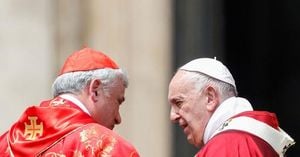Hamas has confirmed the death of its military chief, Mohammed Deif, whose name has been synonymous with the group’s military operations and strategies against Israel for decades. The announcement was made on January 31, 2025, marking the first official acknowledgment of his death after Israel claimed it had successfully targeted him with airstrikes last July.
According to statements from the Al-Qassam Brigades, Hamas’s military wing, the group’s spokesman Abu Obeida highlighted the significance of Deif’s leadership, stating, "The Al-Qassam Brigades announce to our great people the martyrdom of... commander Mohammed Deif, chief of staff of the Al-Qassam Brigades..." This acknowledgment follows months of speculation and denial from Hamas about Deif’s status after the Israeli military reported his death and targeted him during operations aimed at crippling the group.
Israel first claimed to have killed Deif on July 13, 2024, during airstrikes on Khan Yunis, following extensive intelligence assessments. The Israeli military stated, "Deif initiated, planned, and executed the October 7th massacre," when Hamas operatives attacked southern Israel, resulting in the deaths of around 1,200 individuals and taking approximately 251 hostages back to Gaza.
Deif, born Mohammed Diab al-Masri in 1965, took on the leadership of Hamas’s armed wing, the Izzedine al-Qassam Brigades, after rising through the ranks during the first Intifada. For nearly three decades, he was among Israel's most-wanted men and had survived numerous assassination attempts—earning him the nickname “the ghost” because of his elusiveness and resilience against repeated attempts on his life.
Notably, Deif was implicated not only in the October 7 attacks but also had been at the center of major military operations involving the planning and execution of attacks against Israeli targets. He played instrumental roles in the construction of the network of tunnels utilized by Hamas fighters to infiltrate Israel, which became central to the group’s military strategy. Significantly, on Israeli military reports, it was noted, "He became known as Mohammed Deif after joining Hamas during the First Intifada," illuminating his longstanding involvement with the group.
The confirmation of Deif’s death resonates deeply, particularly as tensions remain high following the outbreak of conflict prompted by the October 7 incursion. During the recent war, which has been catastrophic for both sides, reports indicate approximately 47,460 Palestinians have been killed, with significant casualties and damage to infrastructure. The bloodshed has led to accusations of war crimes, particularly directed at both Hamas and Israeli forces.
Along with Deif, Hamas also confirmed the deaths of several other key commanders, including Marwan Issa, who was named as the deputy military commander. His contributions to the group had made him one of the most wanted figures by Israeli intelligence, underscoring Hamas's significant leadership losses. The impact of these losses could indicate shifts within the Hamas leadership as it grapples with the consequences of the conflict.
Following this series of announcements, responses from various international actors have been anticipated, particularly concerning the International Criminal Court (ICC) which has issued arrest warrants for Deif due to alleged war crimes. The ICC reported, “The ICC listed the charges against Deif as crimes against humanity of murder, extermination, torture...”, highlighting the gravity of his alleged actions within the overarching conflict.
Along the lines of these developments, the battlefield remains intensely unstable, showcasing the precarious balance of power between Hamas and Israeli forces. With the prominent figures of Hamas now confirming dead, analysts suggest this may change the dynamics of future operations and the overall strategy of resistance against Israeli actions.
Conclusively, as regions search for stability amid overwhelming violence, the loss of Mohammed Deif is expected to echo throughout the political and military landscapes of Gaza and Israel, influencing everything from combat tactics to potential diplomatic avenues. The depth of leadership losses within Hamas could disorganize their military operations and potentially create space for renewed discussions surrounding peace, albeit with deep-seated animosities still prevalent on both fronts.



